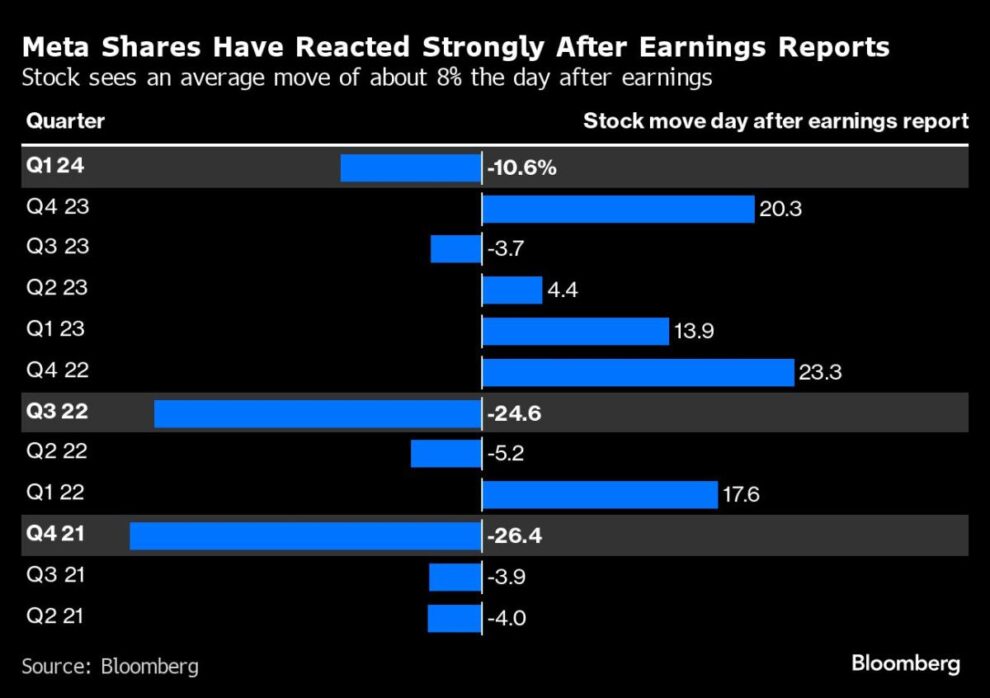
(Bloomberg) — Meta Platforms Inc. investors will be hoping it can do a better job than Microsoft Corp. and Alphabet Inc. in convincing Wall Street that lofty spending on artificial intelligence will be worth it.
Most Read from Bloomberg
Wall Street is taking a more skeptical view of how much is being spent on AI by tech firms and when it will start to pay off in terms of improved growth and profitability. The Facebook parent already irked investors in April by hiking its spending forecast above estimates. Microsoft shares slid on Wednesday after it reported slower growth in its cloud computing unit and said capital expenditures would increase again in the next fiscal year.
“The key question is whether Meta takes capex up even more,” said Denny Fish, who manages the $7.2 billion Janus Henderson Global Technology and Innovation Fund. “The demand environment is pretty good, revenue trends have been strong, and the valuation is still reasonable. However, it sold off last quarter, when things were pretty pristine except for capex, which shows you how much investors are concerned about this.”
Meta, which reports on Wednesday after the close, has already shown some growth uplift from AI as the technology helps improve ad targeting on its social media products. It’s also adding new AI features to WhatsApp, including an AI assistant that can help businesses connect with customers, answer questions, and sell their goods and services via chat.
But investors may have less patience with Meta than other Big Tech names. The shares suffered two post-earnings blowups in 2022 as Meta stuck to its guns on its metaverse strategy, sinking billions of dollars into an unpopular virtual-reality vision. It turned that around in 2023 by proclaiming a year of efficiency marked by heavy cost cuts, and pleased Wall Street in January with a $50 billion buyback and its first-ever quarterly dividend.
The shares are up 31% this year, outperforming peers in part because of Meta’s relatively cheap valuation. Meta trades at about 21 times projected profits, well below the Nasdaq 100’s multiple of 25 times. Still, the stock has fallen recently amid a broader rotation out of the sector, and a misstep on spending could extend the selloff. Options data indicates an implied one-day move of about 8.8% — in either direction — after the results.
Analysts are expecting Meta to report $9.5 billion in capital expenditures this quarter, up around 50% from the year-ago period, while full-year capex is seen coming in at almost $38 billion, according to data compiled by Bloomberg. Net earnings per share are expected to grow 59% this quarter, and revenue is forecast to rise about 20%.
Results from other Magnificent Seven companies have highlighted the importance of capex numbers — and the need for firms to conclusively beat expectations. Alphabet shares dropped last week after the Google parent sunk more resources into AI, fueling higher spending than analysts expected. Microsoft shares slid in premarket trading on Wednesday after growth in the Azure unit disappointed.
Of course, the focus of any spending may be as important as the amount. Bank of America analyst Justin Post wrote in a note that cost cuts in Meta’s augmented reality and virtual reality initiatives could “materially boost” investor sentiment, even if the savings are redirected toward spending on AI.
“While investors have been constructive on AI investment spending and opportunity, we think there is little investor support for the magnitude of Reality Labs spending,” Post wrote, referring to the business division that includes the metaverse.
Meta’s Chief Executive Officer Mark Zuckerberg acknowledged concerns about spending in a recent interview on the Bloomberg Originals series The Circuit with Emily Chang.
“There’s a meaningful chance that a lot of the companies are over-building now, and that you’ll look back and you’re like, ‘oh, we maybe all spent some number of billions of dollars more than we had to,’” he said. Still, over-spending is rational, he said, “because the downside of being behind is that you’re out of position for like the most important technology for the next 10 to 15 years.”
Top Tech Stories
-
Microsoft Corp.’s Azure cloud-computing service posted a slowdown in quarterly growth, disappointing investors anxious to see a payoff from huge investments in AI. The shares fell in premarket trading.
-
Advanced Micro Devices Inc. shares rallied premarket after the chipmaker gave an upbeat revenue forecast, underscoring that its new AI processors are boosting growth.
-
Samsung Electronics Co. reported its fastest pace of net income growth since 2010 and said it plans to double output of the high-end chips fueling the artificial intelligence boom next year.
-
The US is preparing to exclude semiconductor-equipment makers in the Netherlands and Japan from its latest round of restrictions targeting China, people familiar with the situation said, while warning the plans are fluid and may change. Shares in Tokyo Electron Ltd. and ASML Holding NV jumped.
-
Intel Corp. plans to eliminate thousands of jobs to reduce costs and fund an ambitious effort to rebound from an earnings slump and market share losses.
-
Pinterest Inc. warned that revenue in the current quarter will be lower than analysts’ predictions, sending shares plunging in premarket trading.
Earnings Due Wednesday
-
Premarket
-
T-Mobile
-
Autohome
-
CDW
-
CGI
-
Entegris
-
TTM Tech
-
-
Postmarket
-
Meta Platforms
-
MediaAlpha
-
Qualcomm
-
Lam Research
-
Fair Isaac
-
Cognizant
-
Ansys
-
PTC Inc.
-
Western Digital
-
Confluent
-
Kyndryl
-
Tenable
-
Clearwater Analytics
-
Zeta
-
Q2 Holdings
-
FormFactor
-
Axcelis Technologies
-
Riot Platforms
-
PC Connection
-
Knowles
-
Cohu
-
Olo Inc
-
Weave
-
Netgear
-
Magnachip Semiconductor
-
LivePerson
-
–With assistance from Carmen Reinicke.
Most Read from Bloomberg Businessweek
©2024 Bloomberg L.P.












